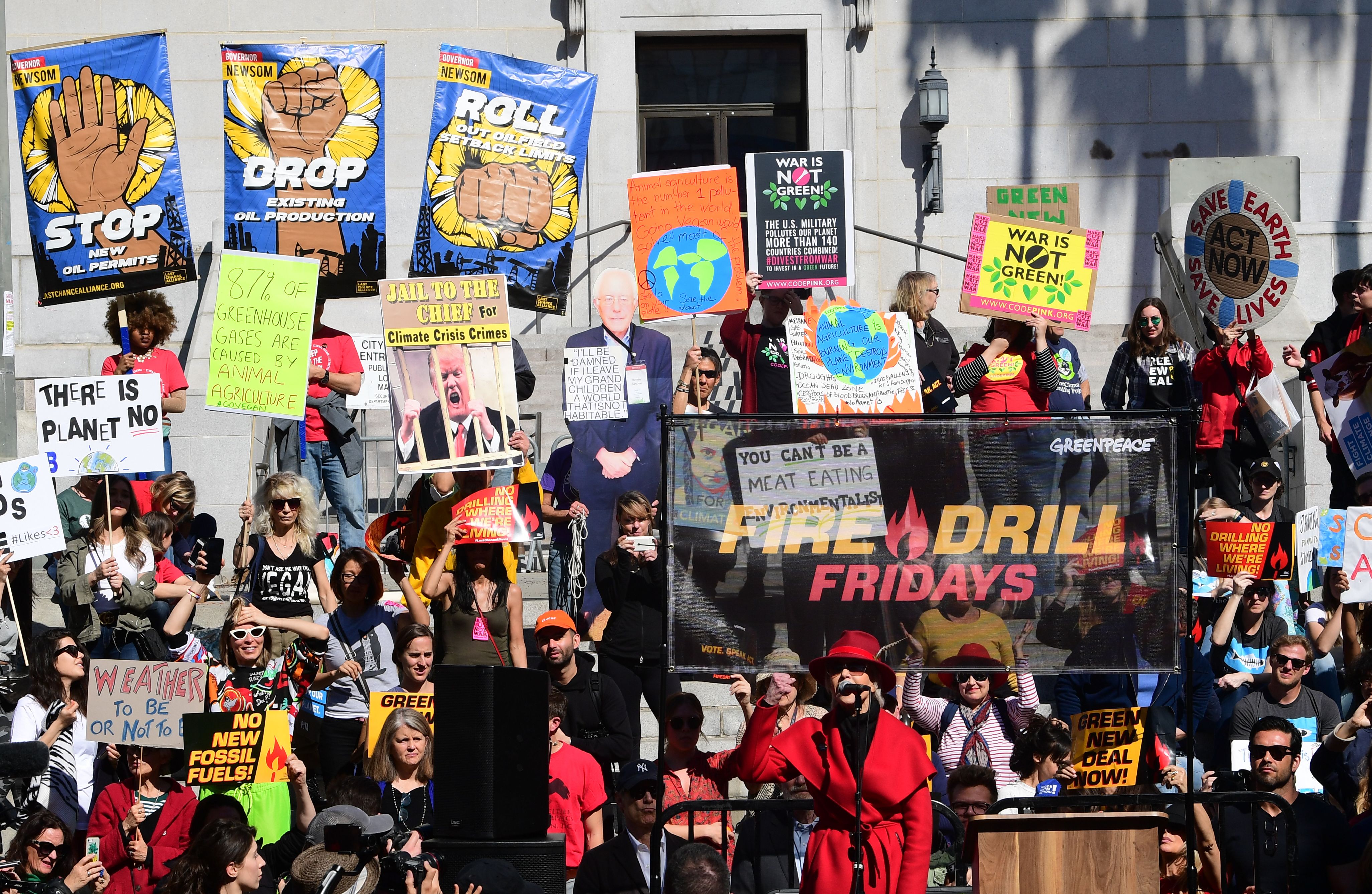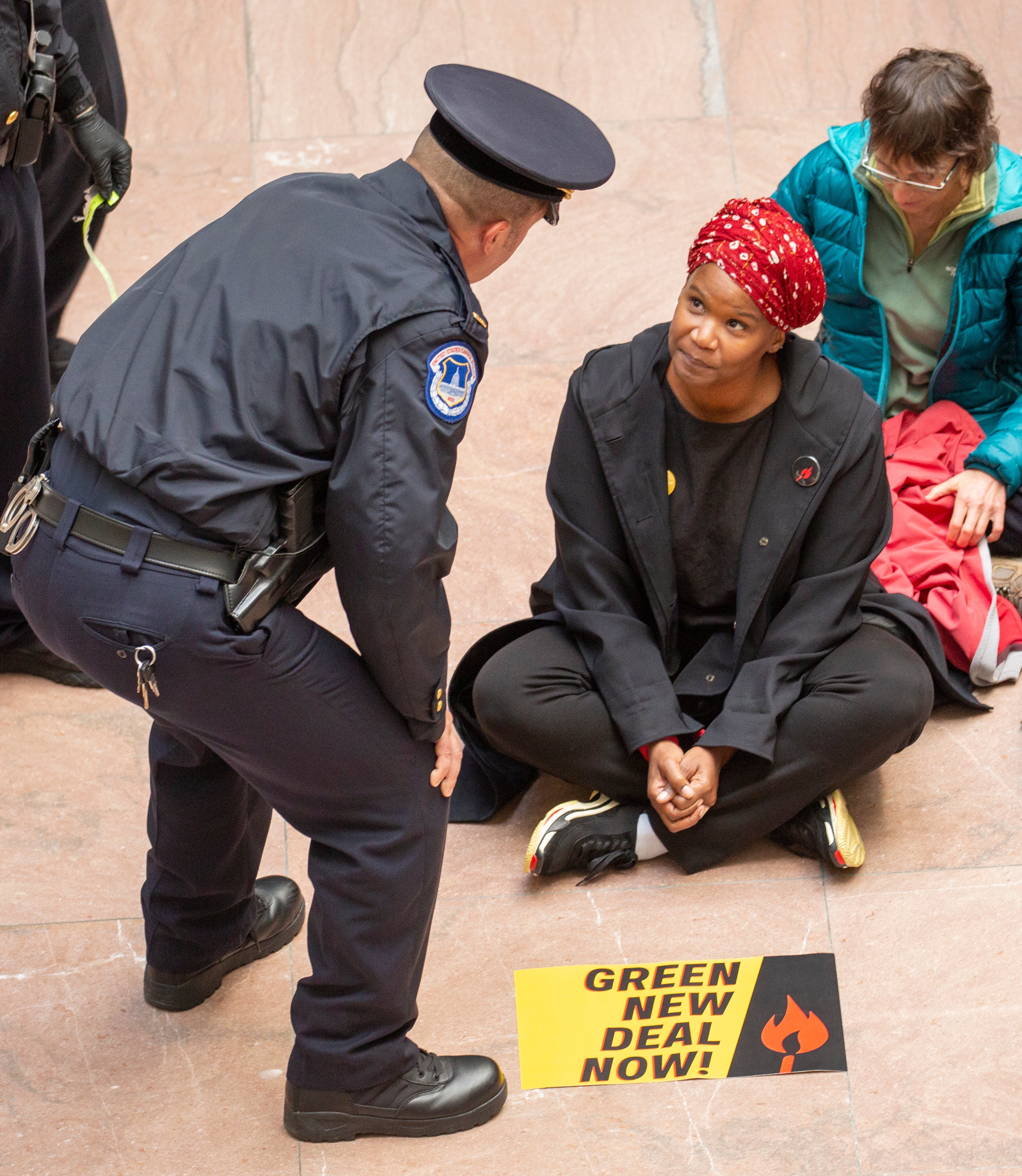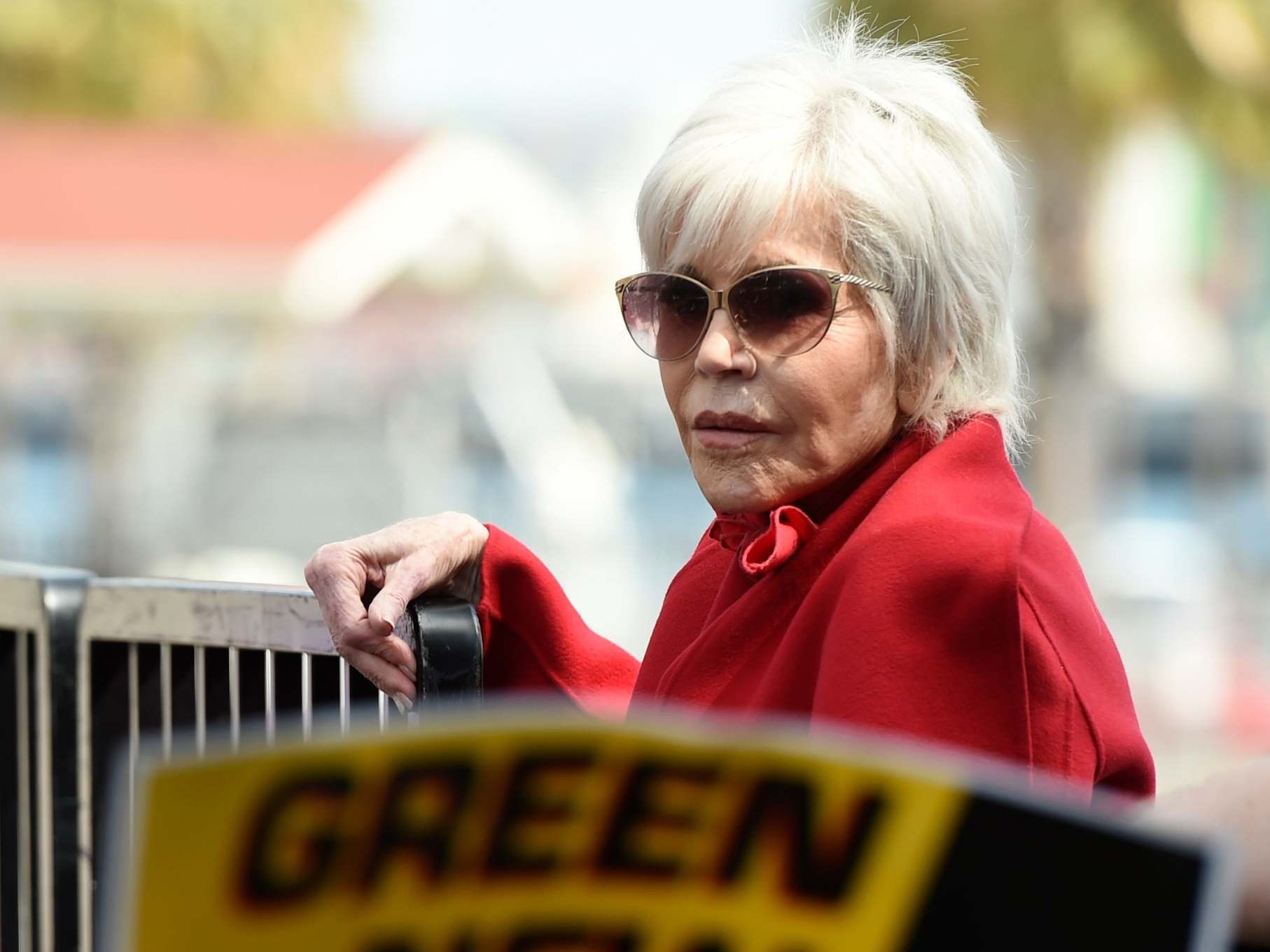‘They’d all been arrested before but sharing a cell with an old white woman in a fancy red coat was a first’
In this exclusive extract from her new book, Jane Fonda recalls a night in a holding pen in Washington DC


Jane Fonda has spent a lifetime on the protest line – fighting for feminist causes, indigenous issues and workers’ rights. She was arrested during an anti-Vietnam war campaign and later publicly vilified for a photograph posing with an enemy anti-aircraft gun on a trip to the country, earning her the moniker “Hanoi Jane”.
Now 82, the actress is still willing to take to the streets, this time to draw attention to the climate crisis. She has leveraged her celebrity status and deployed a strategy of nonviolent civil disobedience, aimed at jolting more people into action and rousing apathetic government and business leaders.
Her new book, What Can I Do?, published today, charts how she took an idea, formed during a hiking trip to Big Sur with friends Rosanna Arquette and Catherine Keener, and built it into a protest movement supported by millions around the world.
Fonda told The Independent: “I was inspired by the important voice of Greta Thunberg and all the young climate activists around the world. "It’s their future we have put at risk and by confronting us with what the scientists are saying, they motivated a lot of us to get off our duffs and take action. Because I’m famous, I have a platform and Greta said we must get out of our comfort zones so I did that by starting Fire Drill Fridays.”
The book follows her move from California to DC to lead weekly climate teach-ins, rallies and peaceful protests on Capitol Hill. In the process, she was arrested five times. She wasn’t alone: dozens were arrested with her including celebrity friends, Ted Danson, Sam Waterston, Joaquin Phoenix, Lily Tomlin, Piper Perabo, Amber Valletta, Diane Lane, and Martin Sheen.
“The climate crisis is collective global issue that requires collective global solutions. I’m glad my book is available and that it will help raise awareness of how dire the climate crisis is, how little time we have to avoid the tipping point, and arm people with practical tips and tools to fight back.”
It was a wonderful rally at the Capitol the next day, the first really cold one so far, yet people turned out in larger numbers than ever. It really hit me that day at our pre-rally briefing that Fire Drill Fridays had turned a corner. It was clear now that we’d touched a nerve, tapped into something that we had hoped was there but hadn’t been sure of: large numbers of people were feeling the need, many for the first time, to put themselves on the line against the climate crisis.
Here’s one example: a young woman named Alexandra Charitan, editor of an online magazine, Roadtrippers, who had learned about us on social media and come down from New York. When she came down again weeks later to risk arrest for the second time, she told me she had never done anything like that in her life and that it had changed her forever. “I’d always been the ‘good girl’, ” she said, tears welling up in her eyes, “always followed the rules. I needed to step away from that and assert who I am. And this Fire Drill Friday action spoke to me.”
I was elated, my heart swelling with the realisation that if we could build out Fire Drill Fridays around the country, we could mobilise more and more people who would become activists, be inspired to vote for a climate president, and demand that she or he be brave like Franklin Roosevelt.
A couple of hours into our group detention in the cold warehouse, the police came and got me, thoroughly patting me down again, putting me into a police van where my plastic handcuffs were replaced by the traditional metal ones. I was shackled to the floor and driven to the DC Central Cell Block, where people are held overnight until their arraignment the next afternoon before a judge, who would decide whether to dismiss the case or sentence the person to jail time.
When I entered the Central Cell Block around 6:30pm, there wasn’t much going on. My feet were again shackled, and I was questioned about whether I had ever been sexually abused. I told them I had. “Were you ever abused while incarcerated?” the officer asked, to which I answered in the negative. There were posters everywhere, it seemed, asking if you had ever been sexually abused while incarcerated and, if so, to call a hotline. I didn’t remember seeing such things the last time I was inside a jail in the 1970s, and I found it spooky.

I was photographed for my mug shot, offered a bologna and cheese sandwich on white bread wrapped in cellophane, and a plastic cup of purple juice of some kind, and locked into a cell by myself with a female guard stationed outside all night to protect me. From whom? I wondered. The only people who could get in were other guards.
It was a narrow cell with two metal-slab “bunk beds” and a metal toilet. No sharp edges, nothing that could be broken off and used as a weapon or for self-harm.
It wasn’t long before other prisoners began to arrive, but I couldn’t see them. Hearing them was a different thing altogether. There was a man who banged on his cell door and walls all night long, emitting heart-wrenching, incomprehensible howls of anger and despair. Guards walked noisily up and down the aisle all night. I was about to ask them to please keep the noise down because I wanted to sleep but then realised what a sign of white privilege that would have been and I shut up, chuckling to myself as I imagined that was something Grace might do if this were a scene from Grace and Frankie.
I was more than aware that I was being treated differently because I was white and famous. A cell to myself, juice when I wanted it, a guard
I was more than aware that I was being treated differently because I was white and famous. A cell to myself, juice when I wanted it, a guard. I had heard just the week before how when Greenpeace’s brave protesters had been arrested hanging from a bridge, blocking an oil-exporting channel at a site in Houston, Texas, the men and women of color had been badly mistreated.
My friend Patrisse Cullors, co-founder of Black Lives Matter, has told me horrendous stories of how her brother, who suffers from schizophrenia, has been brutalised in prison in Los Angeles.
I did wall squats for a while, meditated, and eventually was able to sleep using a sweater as a pillow and my red coat both to soften the metal under me and as a cover. It almost worked.
Sometime the next morning, I was told to get my stuff together and was shackled and handcuffed again and taken by van to another building, where I was held for many hours in a clean white holding pen with a bench and, behind a low wall, another metal toilet.
After an hour or so, four women were brought in. Two were 18 years old, and the other two maybe in their late thirties. All were African American. One of the young women had her feet loosely bandaged and was moaning in pain. Apparently, she had spilled hot grease on them from a pan of chicken she’d been roasting. She said she had left her house in a car with her young child, no shoes, and driven away, scraping another woman’s car in the process. She and the woman had gotten into an altercation, and she said the police had arrested her but left the child alone in the car, so she was understandably upset.
Too many people suffer from the effects of racism and poverty. Will we ever be able to get our country to do better at being more fair to start with?
The oldest one, who was lying on the floor talking to herself, told me she’d been making breakfast and getting ready to go to work at Dollar Tree when she and her boyfriend got into a fight that led to her arrest for domestic violence. It was clear that all of them had been arrested before but that sharing a holding pen with an old white woman in a fancy red coat was a first. I told them I had been arrested for committing civil disobedience because I and a lot of others were trying to raise awareness about the climate emergency.
“Wait a minute, you chose to be in here?” one of them asked incredulously. “What’s this climate thing about?” another one wanted to know. I did my best to explain what was happening to the planet, but it was clearly not of interest. I told them I was a film and TV actor and that helped me get the word out through the press.

They sat up and took a little more notice . . . but not all that much. Clearly all of them had more pressing things weighing them down. “What movies have you made?” one asked. I knew it was likely that they had seen one in particular. “I was in Monster-in-Law with Jennifer Lopez.” Yep, that one all four of them had seen.
After a few hours, I was taken to another, larger holding pen with five other women. After a while, it became clear that none of them belonged in jail. They needed mental health care, decent jobs, freedom from abuse, a supportive community, and basic respect and fairness.
One of the women was shivering, and I lent her my coat. The moment she wrapped it around her, she stood up straighter and held her head high, and I could see how beautiful she was. Had her life been easier, she could have been a model or, I am sure, had any number of other careers.

The guards must have been watching and gotten concerned about how much we were all talking because, eventually, I was taken back to the smaller pen, where I waited alone. I felt badly that I asked for my coat back, but it had already become a symbol of our climate project and I felt I needed to hang on to it.
There was an elderly black woman now in the cell next to me. The whole time I was there, she was on an anguished, incoherent rant. I tried but was unable to make out what she was saying, but she never stopped talking. I felt she was having a psychotic break and wished I could have gotten her the help she needed.
Too many people suffer from the effects of racism and poverty. Will we ever be able to get our country to do better at being more fair to start with, and providing social services and proper mental health care for those in need? It is something worth fighting for. I couldn’t help thinking how all these problems will only be exacerbated as the climate emergency worsens; jobs, health care, social services will all be impacted.
By 1:00pm, I had been unshackled and released to the court. As I walked down the hallway, I could see the jail support team all there along with Emira Woods in her red Liberian robe and head wrap, the wonderful nuns Carol Gilbert and Ardeth Platte, who had been coming to all the Fire Drills and risking arrest, and my adopted daughter, Lulu.
As I hugged them and scanned the faces, I caught sight of my daughter, Vanessa, and burst into tears, so moved that she had stayed over to welcome me out. She was crying, too. It was an important moment for us.
Extract taken from What Can I Do? The Truth About Climate Change and How to Fix it by Jane Fonda, available now (HQ, £20) from Waterstones and Amazon.




Join our commenting forum
Join thought-provoking conversations, follow other Independent readers and see their replies
Comments